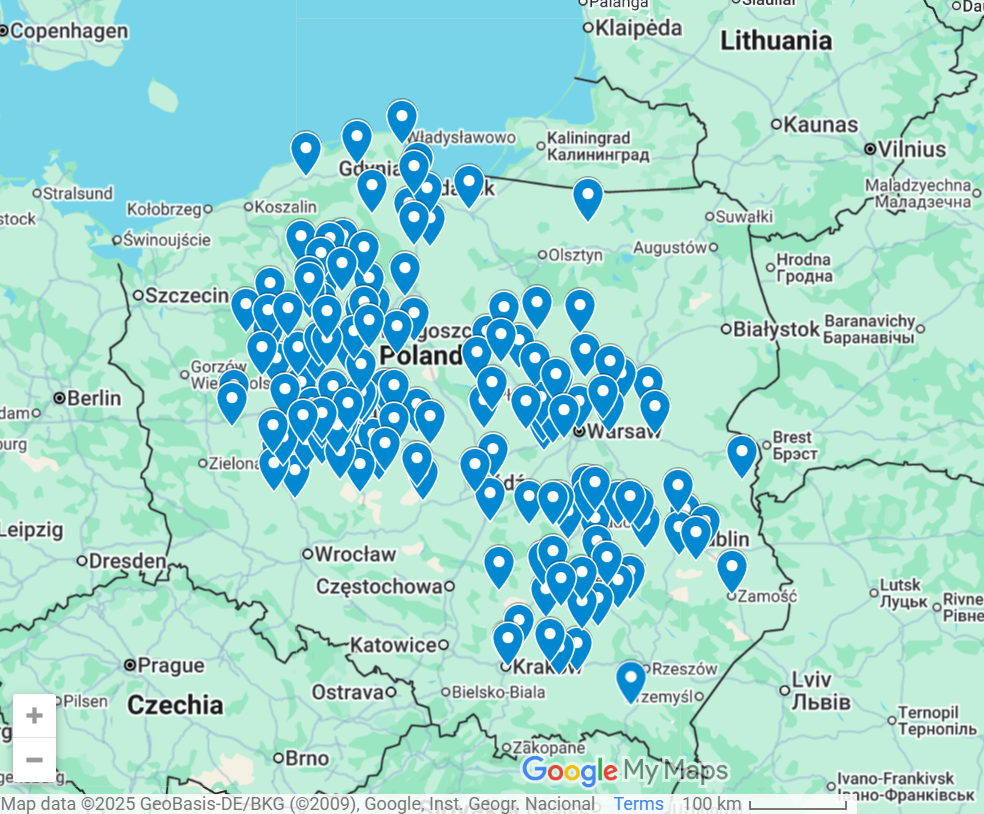I may call Poland a mother and a nourisher, because every year many young Scots come here, and are clothed, fed, and enriched by the abundance of the best crops and gifts, and besides that thirty thousand Scotch families live in her bosom. Poland may certainly be called the mother of our people for this reason, and one of the causes of the wealth of our best merchants, or at least of the great majority of them.
William Lithgow (c. 1582 – c. 1645)
born at Lanark
– The beginnings of Scottish settlement in the area of today’s Gdańsk in the 14th century
– The first expedition of Gdańsk merchants to the Scottish Shetland Islands was recorded as early as 1487
– Privileges of the Polish king Stephen Batory for the Scots
– Robert Wojciech Portius / Robert Gilbert Porteous de Lanxeth (1600-1661)
– Jan Jonston / John Jonston (1603-1675)
– Aleksander Czamer / Alexander Chalmers (1645-1703)
– 3156 Polish tartan
Some places where Scots lived before the era of the partitions of Poland.
Current country borders.

Please note the huge difference in the Polish and English text on Wikipedia pages. Below is an example so you can see for yourself
English version:
Jonston was born in Szamotuły, the son of Simon Johnston, who had emigrated to the Polish–Lithuanian Commonwealth from Scotland. Jonston’s early education was sponsored by one of his two paternal uncles who had come to the Commonwealth(Polish–Lithuanian Commonwealth) with his father.
From 1611 Jonston attended the school of the Bohemian Brothers in Ostroróg, then the Schoenaichianum in Bytom, and from 1619 the gymnasium in Toruń, Royal Prussia. As a Calvinist, he could not attend the Catholic Jagiellonian University. Consequently he earned his first degree at the University of St Andrews (1622–25; M.A., 1623), where he studied theology, scholastic philosophy, and Hebrew. His sponsors included the Primate of All Scotland, John Spottiswood.
Polish language version translated to English:
Jan Jonston was born in 1603 in Szamotuły, then within the borders of the Polish-Lithuanian Commonwealth. For almost his entire life he was associated with Wielkopolska (the name of the province) and felt Polish. He often wrote about himself in documents and works written in Latin „Polonus”, „Lesnense” or „Scoto-Polonus”[3][5][4]. This is evidenced by, among others, the scholar’s own handwritten entries preserved in the matriculation books of foreign universities where he studied: Polonus, medicinae studiosus in Groningen, Scoto-Polonus medicinae, philosophiae et atrium collentissimus in Franeker[3][4].
From 1611 he studied for three years at the Czech Brethren school in Ostroróg, from where he moved to the Evangelical grammar school in Bytom Odrzański, where he studied in 1616–1617. He continued his education at the grammar school in Toruń (1619–1623), where he acquired an excellent knowledge of Hebrew. In the years 1623–1625 he studied Hebrew, philosophy and theology in Scotland (at St. Mary’s College at the University of St Andrews). He settled in Leszno, where he worked as a private and grammar school teacher[3].
